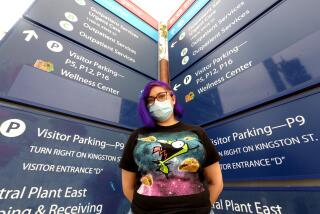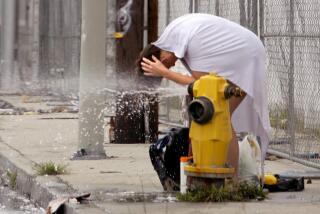A New Operation : Medicine: Harbor-UCLA resident physicians are using a mobile clinic to bring free health care to poor patients. The service will make the rounds three times a month.
- Share via
The Sandoval twins were feeling peaked. An older woman worried about a suspicious trash; another woman simply felt weak.
So when they heard “the doctors” were visiting Lawndale last weekend, they lined up for treatment at a free mobile clinic operated by a group of young physicians in training at Harbor-UCLA Medical Center.
The new venture is an urban M*A*S*H unit of sorts, a means of bringing medical care to the homeless and others who cannot afford treatment in a private doctor’s office. Known as the Harbor Mobile Clinic, it was launched in mid-September as an outgrowth of the Harbor-UCLA Department of Family Medicine.
Three times each month, it will visit sites across the South Bay to provide basic medical service free to those who need it. Its staff consists primarily of family medicine residents volunteering some of their scant free time. The goal: to treat the needy, including some of an estimated 20,000 to 30,000 homeless in southern Los Angeles County.
Last Saturday afternoon, the mobile clinic set up shop next to the House of Yahweh, a nonprofit soup kitchen and charitable agency in Lawndale.
With no formal advertising, the clinic quickly drew 33 patients.
“That was just a little bit of word-of-mouth. They’re going to be overwhelmed next month; I just know it,” said Sandy Cima, House of Yahweh social service coordinator. “We are just thrilled. It’s a much-needed program.”
Some patients had to wait an hour or more before seeing a doctor. But that, they said, was nothing.
“If you go to (UCLA) Harbor General, you have to spend the whole day,” said Marta Mercado, 30, a Lawndale resident who cleans houses for a living and said she cannot afford health insurance. She described how she once sat in the Harbor-UCLA emergency room for 12 hours with an ailing relative.
When her 23-month-old son recently fell ill, she chose not to risk that long wait, instead paying $60 to see a private doctor and $40 for medication--a stiff bill for a family lacking insurance.
“If somebody makes (low-cost) insurance, we (would) take it. Everybody would take it,” Mercado said. “Everybody who has little kids--it’s real important. We don’t care for ourselves.”
Salvador Sandoval of Lawndale said he does not make enough money at his machine-shop job to pay for family insurance. So Sandoval and his wife, Celia, brought their twin 14-month-old sons, Ivan and Irvin, to be examined by the clinic doctors. The diagnosis: infections in the right ears of both. The parents departed with a sackful of medicine.
Of the 33 patients seen Saturday, four were referred to the Harbor-UCLA family medicine center for further treatment.
Many were working poor, people whose wages are so low that they cannot afford medical care, officials said. But when the mobile unit visited Alondra Park near Torrance last month, many or all of the 23 patients appeared to be homeless.
What sets this clinic apart is that it is the creation of a group of young doctors specializing in family medicine at Harbor-UCLA. It is an entirely new venture for the residency program, officials said.
The Harbor-UCLA residents said they do not mind donating some of their time off to work with the clinic. The medication given to patients is either contributed by drug companies or purchased with donations.
The idea grew out of a retreat at Lake Arrowhead where residents expressed an interest in taking a more active community role. The residents are licensed physicians who have chosen to specialize in family medicine.
Dr. Shaila Serpas , 28, a second-year resident from Long Island, knew of a mobile unit connected to a New York City hospital and wondered if a South Bay counterpart was feasible.
“I really wanted to affect the community that Harbor serves,” Serpas said.
Residents held meetings and searched for sites and donations. A crucial juncture came, Serpas said, when Los Angeles County Supervisor Deane Dana arranged for them to borrow a county van during off-hours to transport staff and equipment.
The clinic last weekend was staffed by residents, staff physicians, nurses and relatives.
Dr. Antonio Gutierrez, 37, brought along his teen-age son and daughter to serve as translators between Spanish-speaking patients and English-speaking doctors.
“I feel like somebody has to do something for these people,” said Gutierrez, a second-year resident. “At some point, we have to go to the people.”
Beckie Strode, administrative assistant with the program, sat at a table processing patients and trying to help them feel more comfortable.
The relatively primitive setting requires a different type of medicine, said Dr. James Huang, 28, a third-year resident. Because they are working miles from a hospital, doctors cannot instantaneously order up a series of tests.
“You really have to use your judgment . . . to see which patients are serious and should be referred back to the clinic,” Huang said.
The mobile clinic has begun its rounds during a grim period for public health funding in Los Angeles County, where 16 health centers, including one in Torrance, last month narrowly escaped being shut down to save money.
“The county budget is very strapped, so we’re not using any (county) resources,” said Dr. Patrick T. Dowling, chairman and associate professor at the Harbor-UCLA Department of Family Medicine.
Dowling called the clinic “a way of reaching people who are falling through the cracks.”
He noted that 2 million children in California currently lack health insurance, undermining their basic health care.
At the clinic last weekend, several young children received immunizations, including one girl, almost 3, whose mother said she had not received shots since she was a few months old.
Another patient, Susan Doran, 51, was given medication and a referral for more care at Harbor/UCLA.
“It’s just a miracle, because I’ve been trying to get to (County-USC Medical Center),” said Doran, who learned about the clinic when she stopped by the House of Yahweh. “I was just shocked when they came in and said the doctor was here . . . I don’t even have bus fare to get to USC.”
Doran said she suffers from a heart ailment and related circulatory problems. Her two sons have lost their jobs, and she lives with them in a Hawthorne motel room.
After her exam, Doran was glowing with praise for the residents.
“The doctors took their time. They didn’t rush us. They seemed really concerned and wanted to know (our) background history,” she said.
“Something like this,” she added, “if they had it all over L.A., it would cut down on people going to the hospital.”
More to Read
Sign up for Essential California
The most important California stories and recommendations in your inbox every morning.
You may occasionally receive promotional content from the Los Angeles Times.













